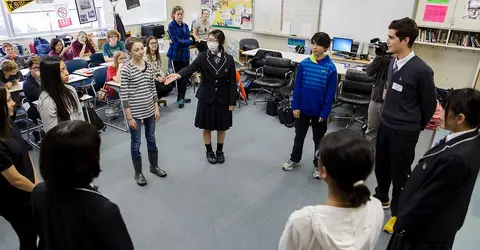Passport or visa to go to Japan? パスポートとビザの違いとは ?

Planes pass each other at Kansai airport
JNTO
For each type of stay, its appropriate document
Business, education, or tourism, visitors to Japan can be diverse and varied as the documents necessary to enter Japan. Do I need a visa or do I qualify for a 90 Days visitor status without a visa? The requirements can vary depending on your nationality... No worries! Japan Experience will guide you through the steps to acquire the proper documents required to visit Japan!
The passport: the ally of short stays in Japan
Whether it is to learn the language or to discover the archipelago, the American passport is sufficient to travel to Japan for up to 90 days without a visa. The passport must then be valid, and its owner must abide by the following conditions: no commercial activity on Japanese territory for the duration of the stay and provide proof of return flight itinerary within the 90 days permitted.
Note that non-biometric passports are also admissible for travel to Japan if they are valid and that the limited period of 90 days also applies to American, U.K., Spanish, Belgian and Italian nationals. *Belgian passport holders are permitted to stay without a visa for a period less than or equal to 180 days.
The visa: the essential to stay in Japan for more than 90 days
Whether you come to tour the country by bike or perfect your kanji, the visa application will be mandatory if you plan to stay in the Japanese archipelago for more than 90 days (or more than 180 days for our Swiss friends). The latter must then be made at the Japanese Embassy or the local Consulate General's Office and must be consistent with the intended purpose of the trip.
Each type of stay has its unique visa! Student visa for more than 3 months, "work" visa for foreigners working on Japanese soil, cultural visa for people visiting to learn traditional art, or even working holiday visa for people under 30 wanting to visit the country for a whole year, there are as many visas as there are reasons for staying!
To answer most of the questions, here is the conditions necessary to obtain three visas in great demand for Japan: the working holiday visa, the student visa, and the "work" visa.
For more information on the different types of visas for Japan, we advise you to refer to the dedicated page on the Japanese Embassy website, section "Work and Long Stay".
The working holiday visa
Also called PVT (Working Holiday Permit), the working holiday visa allows young American people to stay in Japan for a maximum of one year. The main purpose of the trip will have to remain tourism here, but the PVT holder will nevertheless have the possibility of supplementing his finances by having the right to work less than 28 hours per week in Japan.
Be careful though, not every activity is worth taking! And activities considered "unwholesome" (according to the criteria defined by Japanese immigration) are not authorized with this type of visa. This category includes odd jobs in nightclubs, part-time jobs in pachinkos (game rooms), or side jobs in bars where alcohol flows freely.
Ideal for traveling across the country while making pocket money, the working holiday visa is therefore particularly requested. This is why a maximum quota is set at 1,500 participants each year, and special conditions must be met to qualify.
It is thus necessary to be of legal age and under 30 years of age on the date of submission of the file, not to have benefited from this type of visa before for Japan (it is only possible to obtain a holiday visa once work to the same country), not have a dependent minor during the stay, have a return flight booked, have a minimum of $3,375/3,100€ in their bank account ($5,450/5,000€ if not in possession of a return flight at the time of the visa application), have a medical certificate justifying their good health, and have a valid passport.
Once the PVT has been obtained, it must be used in the current year and will be considered "activated" upon the next entry on Japanese soil.
Need clarification on the PVT? Go to the "Working Holidays" page of the Japanese Embassy in France website.
Student Visa
If you want to go on a university exchange or study the language in a Japanese school for more than 3 months, you will need a student visa.
The latter is requested from Japanese immigration by the schools or universities chosen by the beneficiary and will be granted if all the necessary conditions are met. The latter generally take the form of a minimum level of diploma (baccalaureate for schools, license or master's degree for university exchanges), payment of tuition fees (between $6,540/6,000€ and $16,350/15,000€ depending on the type of schools requested), and an external guarantee (usually a parent). In some cases, prospective students will also need to provide a "Certificate of Eligibility" (COE) beforehand to facilitate the visa application, later on, the COE being a way for immigration to check in advance whether the file of the candidate is eligible to apply for a student visa.
Finally, note that as for the PVT, the student visa allows you to do a small extra job to finance your studies.
For more information about the student visa, we invite you to consult the page dedicated to studies in Japan of the Embassy of Japan or to inquire directly with the school or university chosen.

Learn Japanese in Japan with a Student Visa
Commons Wikipedia
The different types of "work" visas
Whether you are transferred to Japan under an expatriate contract from France or whether you have found a job there, the "work" visa will be compulsory if you wish to carry out a remunerated activity in Japan in the long term.
We will speak here of a "work" visa since it allows you to work full-time in Japan, but be aware that there is no "work visa" strictly speaking since each activity once again has its visa. We will thus find, for example, the artist visa, the research visa (for professors-researchers), the jurist visa, the visa linked to religious professions (priests, nuns, etc.), the medical services visa, or even the visa "specialist in humanities, engineer, and international services" which includes a large part of the professions accessible to foreigners such as office worker, translator, or even designer or computer scientist.
The latter is granted for 1 year, 3 years, or 5 years, and can be renewed indefinitely as long as the employee justifies a full-time employment contract for a monthly salary greater than 200,000 yen ($1,700/1,560€) and a bachelor's degree or 10 years of professional experience in their field.
For more information on the different types of "work" visas, we advise you to consult the official website of the Japanese Ministry of Foreign Affairs at this address (link in English).
Whatever the length of your stay in Japan, do not hesitate to take advantage of our Japan house rental offers.











